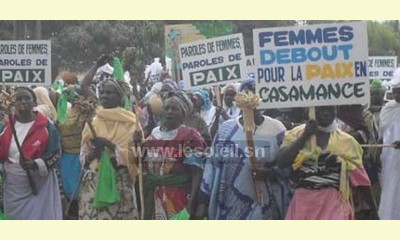|
|
Casamance [Senegal] : The UN Resolution on Women, Peace and Security should be taught in school
un articulo por Maurice, Le Soleil
The president of the Bignona Platform of Women for
Peace in Casamance, Senegal, Fatou Doucouré
Sindian, called on Saturday for the government to
introduce into schools the 1325 UN resolution on
women, peace and security, in order to establish a
culture of peace.

click on photo to enlarge
"We ask the Minister of Education and teachers to
introduce Resolution 1325 in the schools. But it
is the minister who should take the lead the fight
alongside women and children to put into effect
the Resolution 1325 of the United Nations," said
Ms. Doucouré, during a community meeting
concerning the applicability of 1325 to Sindian.
More than 30 villages in the district were
represented at the meeting organized by the
Movement against Small Arms in West Africa (Malao)
and the Programme for prevention and management of
crises in Casamance of the Konrad Adenauer
Foundation. The departmental head of Bignona
Platform invited the Minister of National
Education Serigne Mbaye Thiam to get involved in
promoting the resolution, for a culture of peace
in schools. Ms. Doucouré also denounced the
television programs showing violence that are
"very religiously" followed by children.
"We say no to that, because it teaches the child
to make war. We ask the Minister of Education to
establish a peace program in the schools, "she
added. Fatou Doucouré believes it is time for the
leaders of civil society to go to the areas very
affected by the Casamance crisis and to educate
women about the existence of the resolution 1325
passed by the United Nations, for their
protection. Another member of the Platform, Fatou
Badji Aris, argued for a broad dissemination of
this resolution, and for the authorities to know
and apply it. Diatou Cissé, the Director of the
community radio Fogny Sindian FM , believes that
the women, "some of whom become heads of
households and ensure by themselves the education
of their children," are the most affected by the
conflict in Casamance.
(Click here for a French version of this article)
|








|
DISCUSSION
Pregunta(s) relacionada(s) al artículo :
UN Resolution 1325, does it make a difference?,
* * * * *
Comentario más reciente:
A recent study by the NGO Working Group on Women, Peace and Security is critical of the UN Security Council for its inconsistent implement of Resolution 1325 that calls for an increased role of women in peacekeeping and peacebuilding. The full report is available on the Internet on the website of womenpeacesecurity.org.
The working group members are an impressive group of active international NGOs: Amnesty International; Consortium on Gender, Security and Human Rights; Femmes Africa Solidarité; Global Action to Prevent War; Global Justice Center; Human Rights Watch; The Institute for Inclusive Security; International Action Network on Small Arms; International Alert; International Rescue Committee; Refugees International; International Women’s Program of the Open Society Foundations; Social Science Research Council; Women’s Refugee Commission; Women’s Action for New Directions; Women’s International League for Peace and Freedom.
Here is the report's Summary of Findings
General trends in the Council over the last 12 years have shown significant development, including in the language and expertise on women, peace and security in resolutions, more expertise available to deploy in terms of gender advisors and women, peace and security, and a more sophisticated understanding of the key issues at the root of this agenda. There is a better understanding of, for example, what it takes to have disarmament, demobilization, and reintegration processes that are responsive to women; security sector reform that is responsive to women; and post-conflict elections that support women candidates and women voter. However, there is inconsistency in the Council’s deployment of that knowledge. There is still a significant disconnect between the content of reports received by the Council, meetings the Council holds, and resolutions it adopts.
There have been a number of positive developments in the Council’s use of women, peace and security-specific language in its policy over the last year. For the first time, for example, the Council used women, peace and security language in its resolution on Cyprus. However, there have also been inconsistencies. The Council’s initial lack of support for women in September 2011’s resolution on Libya was rectified by strong support in its March 2012 renewal. . ... continuación.

|
|









